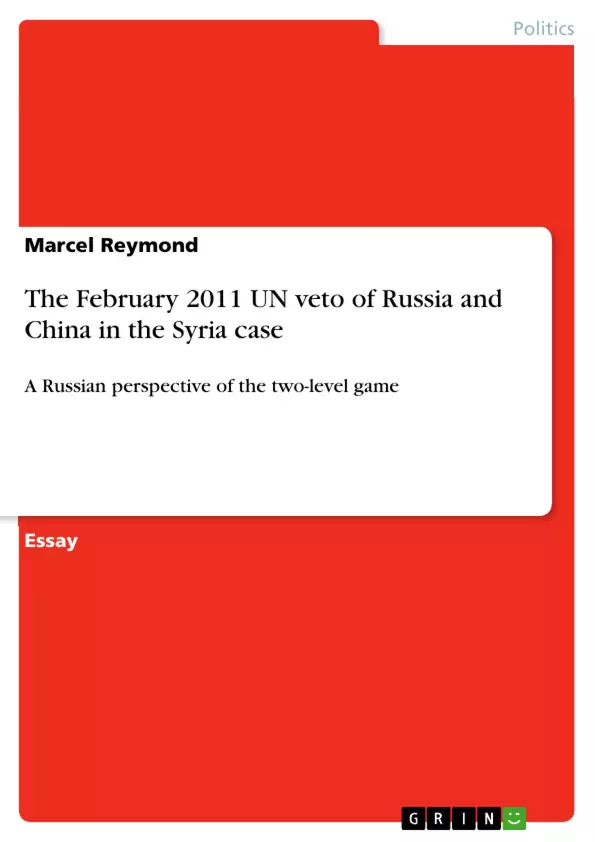On February 4th 2012, Russia and China vetoed an Arab-West plan in the United Nations (UN) Security Council (SC). The plan called for Syria’s President Bashar al Assad to step down. Russia, in particular, has often used the outcome of the Libyan resolution as a justification for its Syria vetoes.
This paper applies the two level game theory of Robert Putnam, and the foreign policy (FP) decision-making model by Margaret G. Hermann and Charles F. Hermann. Its aim is to provide evidence to substantiate the hypothesis that domestic Russian interests were the driving factor behind the double SC vetoes and that China had echoed the move to honor its strategic partnership agreement with Russia.
Firstly, the paper will briefly explain the two-level game theory as well as the foreign policy decision-making model. Secondly, will follow an analysis of the international environment (level one) which influenced the veto decision. Thirdly, an investigation of the domestic game (level two) will be carried out, using the Hermann model before drawing to a conclusion.
The lack of access to detailed decision making protocols and the haziness surrounding the relevant domestic decision makers in Russia, have made it impossible to clearly identify the members of the ultimate decision making unit and the level one rationale for the Syria veto. One can assume, that in all likelihood, a single group composed of different players within the Russian elite, influenced the decision. China’s exact interests or its reasons to use its veto power remain undefined. It seems to be relatively safe to claim that Russia was the driving factor behind the veto and that China followed suit. The paper concludes that Russia’s national security concerns and its wish to be recognized once more as a great power, (this implies some anti- western feelings) were, in all likelihood, the important reasons behind the veto.
Inhaltsverzeichnis (Table of Contents)
- Introduction
- Two-level game theory and the foreign policy decision making model
- Level one: Draft resolution S/2012/77
Zielsetzung und Themenschwerpunkte (Objectives and Key Themes)
This paper analyzes the Russian and Chinese vetoes of the UN Security Council resolution regarding Syria in February 2011. It aims to provide evidence for the hypothesis that domestic Russian interests were the primary motivation behind the veto, with China following suit due to its strategic partnership with Russia. The paper applies the two-level game theory of Robert Putnam and the foreign policy decision-making model by Margaret G. Hermann and Charles F. Hermann to analyze the international and domestic factors influencing the decision.
- The role of domestic politics in international relations
- Russia's evolving foreign policy and its relationship with the West
- The significance of national security concerns in Russia's decision-making
- China's approach to international intervention and its strategic partnership with Russia
- The impact of the two-level game theory and the Hermann model on understanding the veto decision
Zusammenfassung der Kapitel (Chapter Summaries)
- Introduction: The paper introduces the context of the February 2011 UN Security Council veto by Russia and China, outlining the circumstances leading up to the decision and briefly discussing previous similar vetoes related to Syria and Libya. It then introduces the two-level game theory and the Hermann model, which will be used to analyze the decision-making process.
- Two-level game theory and the foreign policy decision making model: This chapter provides an overview of Putnam's two-level game theory, emphasizing the importance of both international and domestic factors in shaping foreign policy. It also explains the Hermann model, which focuses on identifying the key actors and decision-making units involved in foreign policy decisions.
- Level one: Draft resolution S/2012/77: This chapter analyzes the international context surrounding the veto, including Russia's evolving foreign policy since the fall of the Soviet Union, its relationship with the West, and its desire to assert its role as a major power. It also discusses China's foreign policy principles and its strategic partnership with Russia.
Schlüsselwörter (Keywords)
The main keywords and focus topics of this paper include: UN Security Council, veto, Syria, Russia, China, two-level game theory, foreign policy decision-making, domestic politics, international relations, national security, strategic partnership, multi-polarity, Western hegemony, state sovereignty, interventionism.
Frequently Asked Questions
Why did Russia and China veto the UN resolution on Syria in February 2012?
Russia primarily vetoed to protect its domestic interests and national security, while China followed suit to honor its strategic partnership with Russia and oppose Western interventionism.
What is the "Two-Level Game Theory"?
Robert Putnam's theory suggests that international negotiations are influenced by two levels: international pressure (Level I) and domestic political constraints (Level II).
How did the Libyan case influence the Syria veto?
Russia felt that the outcome of the Libyan resolution was misused for regime change, leading to a more cautious and oppositional stance regarding similar interventions in Syria.
What are Russia's main concerns in the Syria case?
Russia aimed to be recognized as a great power, protect its regional influence, and prevent what it perceived as Western-led destabilization of sovereign states.
What is the Hermann model of decision-making?
It is a model used to identify the key actors and decision-making units (e.g., a single leader or a small group) that shape a country's foreign policy.
- Citar trabajo
- Marcel Reymond (Autor), 2012, The February 2011 UN veto of Russia and China in the Syria case, Múnich, GRIN Verlag, https://www.grin.com/document/202344



